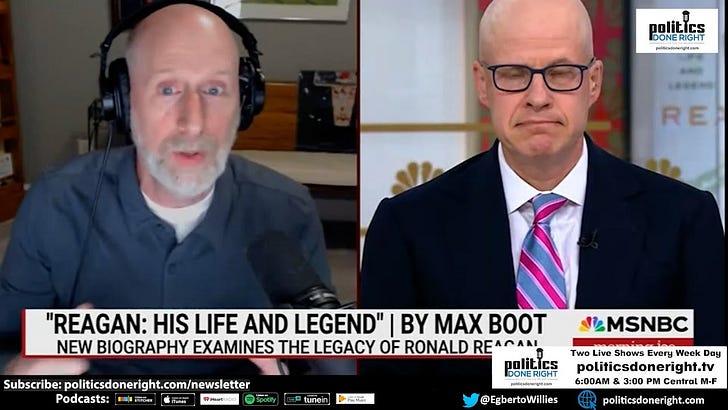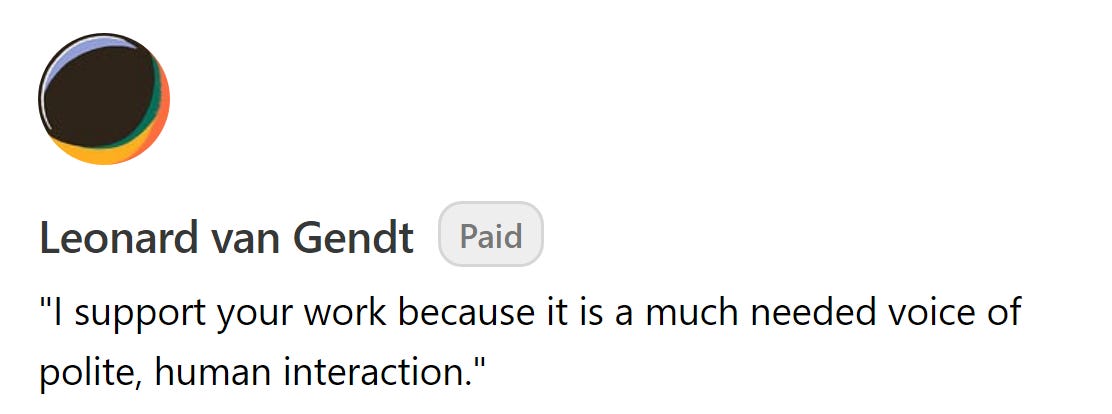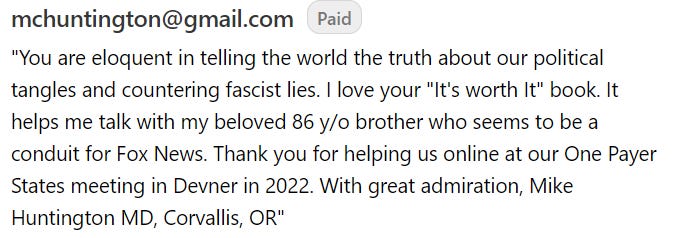Conservative: GOP’s a con job – The Republican Party is a repudiation of Ronald Reagan. Really?
New York Times conservative columnist David French appeared on a Morning Joe panel with author Max Boot to discuss his book on Ronald Reagan. It turns out Reagan does share some similarities w/ Trump.
THANK YOU IN ADVANCE FOR YOUR SUPPORT! We are feverishly working triple time to ensure we win this existential election.
We are grateful for our Paid Subscribers and Free Subscribers. In this political climate, we need several hundred more Paid Subscribers. Misinformation funded by the deep pockets of our Oligarchy floods the internet. We are using all our platforms on-air, online, and in publications to counter that. We ask that you invest the equivalent of less than a coffee to ensure we can keep doing this effectively. Please invest in a Democracy that serves all of us by becoming a paid subscriber. It comes with many benefits.
Is the Republican Party just Ronald Reagan on steroids?
In a recent episode of Morning Joe, a discussion unfolded between David French, a conservative columnist from The New York Times, and Max Boot, an author and historian who wrote extensively about Ronald Reagan. The exchange explored a critical and evolving issue within conservative politics: the idea that today’s Republican Party has not only drifted from Reagan’s legacy but is, in fact, a repudiation of it. French claimed the GOP had transformed into a “con job,” with many Republicans falsely believing that Trump represents a continuation of Reagan’s legacy. Boot offered a more nuanced take, suggesting that while the modern GOP differs significantly from Reagan’s time, there are also disquieting continuities between the two.
The Myth and Reality of Reagan
The discussion between French and Boot touches on a fundamental question: What is Ronald Reagan’s true legacy, and how has it shaped the Republican Party today? French argues that Reagan and Trump are essentially opposites, with Trumpism representing a fundamental departure from the principles Reagan espoused, particularly on immigration and economics. In French’s view, the GOP’s current trajectory under Trump is a “con job,” luring voters under the pretense that they are carrying forward Reagan’s vision.
While agreeing that substantial differences exist, Max Boot reminds us that Reagan’s legacy is not the unblemished ideal many conservatives present. Boot’s research highlights the uncomfortable fact that Reagan, much like Trump, played into white backlash politics, engaged in misinformation (or “fake facts”), and ignored crises, such as the AIDS epidemic. These elements of Reagan’s presidency are often downplayed in conservative circles, but they remain critical to understanding how the Republican Party has evolved.
The Romanticized Reagan vs. the Real Reagan
The romanticized version of Reagan—one of a principled statesman who promoted conservative values like fiscal responsibility, national security, and small government—has been a cornerstone of GOP identity for decades. For many Republicans, Reagan is a revered figure, the epitome of what a Republican president should be. This image, however, omits many darker aspects of Reagan’s presidency. Under Reagan, the national debt ballooned, the wealth gap widened, and his administration’s “trickle-down” economic policies laid the groundwork for the current economic inequality that continues to plague America today. It decimated a large percentage of the middle class.
Moreover, Reagan’s handling of social issues was not as progressive as some admirers claim. He was, at best, indifferent to the AIDS crisis, waiting years before addressing it publicly, a response that mirrors Trump’s indifference to the COVID-19 pandemic. Both presidents allowed major health crises to spiral out of control, with devastating human costs. Additionally, Reagan’s use of dog-whistle politics—such as his invocation of the “welfare queen” stereotype—exploited racial animosities in ways that Trump later emulated on a grander scale.
Trump: A New Low or Just the Inevitable Conclusion?
French and Boot diverge slightly when analyzing how far the GOP has strayed from Reagan’s principles. French suggests that Trump represents an outright repudiation of Reagan, a dramatic departure from the party’s supposed ideals. Boot, on the other hand, acknowledges a disturbing continuity. Trump, with his embrace of xenophobia, economic protectionism, and “alternative facts,” may have intensified the GOP’s worst tendencies, but he did not create them. These elements were always present, even if they were less visible during Reagan’s time.
Reagan and Trump differ in style—Reagan was affable and articulate, whereas Trump is brash and confrontational—but both harnessed a populist undercurrent that exploited racial anxieties and economic frustrations. Reagan’s policies disproportionately favored the wealthy and corporations, while Trump’s tax cuts followed the same playbook. Both men found success by appealing to a base that felt alienated and left behind by progressive movements, although Trump’s appeal to this base has been far more explicit and divisive. Their fusion of the political and the evangelical are nearly identical.
The Republican Party’s Continued Descent
The argument that the GOP has entirely repudiated Reagan’s legacy ignores the uncomfortable truth that Reagan himself laid the groundwork for many of the party’s modern ills. Trump may represent the culmination of the GOP’s slide into authoritarianism and demagoguery, but this slide began long before Trump entered the political arena. Reagan’s administration planted the seeds of neoliberalism, anti-government sentiment, and racial division that have grown into today’s Trumpist movement. One must not forget Reagan’s 1980 states’ rights speech at the Neshoba County Fair in Neshoba County, Mississippi near the site of the 1964 murders of Chaney, Goodman, and Schwerner. It was one of those overt dog whistles.
David French is correct that the Republican Party has changed dramatically since Reagan. Still, the real question is whether those changes represent a deviation from Reagan’s principles or a natural evolution. The party’s embrace of Trump and its continued commitment to misinformation, racial division, and plutocratic policies suggest that Trump is not an aberration but the logical extension of the Reagan era. The GOP has always prioritized the interests of the wealthy while using cultural and racial wedge issues to distract and divide working-class voters. Trump’s unique contribution has been to strip away the pretense of civility, making explicit the racism, xenophobia, and disregard for democratic norms that were always lurking just beneath the surface of the Republican Party.
The GOP’s Legacy of Deception
Max Boot’s reminder that Reagan’s legacy is more complicated than the myth suggests serves as a necessary counterbalance to David French’s lament over the party’s current direction. Reagan may have been less overtly authoritarian than Trump, but both men contributed to the GOP’s long history of serving corporate interests while using fear and division to win elections. The Republican Party’s so-called repudiation of Reagan is, in many ways, a con job in itself—one that obscures the deeper, more uncomfortable truth that Reaganism laid the foundation for Trumpism.
In this light, the Republican Party is not merely a “con job” under Trump; it has always been built on deception, from Reagan’s “voodoo economics” to Trump’s outright lies. The task for progressives is to expose this deception and build a political movement that serves the interests of all Americans rather than the wealthy few.
Viewers are encouraged to subscribe and join the conversation for more insightful commentary and to support progressive messages. Together, we can populate the internet with progressive messages that represent the true aspirations of most Americans.
Can we count on your help to reach our goal of 300 needed new paid subscriptions by the end of the month?
The other side has big donors and everyday citizens who invest heavily in platforms that lie and misinform. All we have is you. So, please invest in our media outlet by clicking the subscribe button below to become a paid subscriber. You won’t miss that coffee, but it will make a difference in our politics as we spread the truth about our policies and progressive politics. All paid subscribers get to read my five books on this platform and all subsequent books I write. They will also be privy to subsequent incentives.








